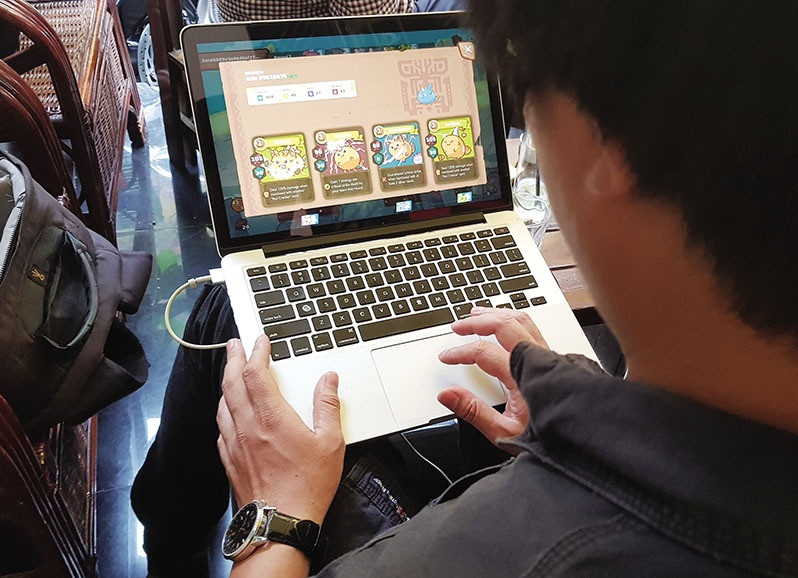In recent years, Vietnam's gaming industry has seen rapid development and exceptional growth, now ranking fifth globally in revenue. Industry experts consider this a golden era for enterprises to invest in culturally inspired games that reflect the spirit of Vietnam.
A promising niche market

Dang Bao Hue, Art Director of Lac Bird Group, emphasized that culture is a profound theme in Vietnamese game development, closely tied to both material and spiritual life.
Accordingly, Lac Bird’s games not only showcase architectural elements Vietnamese people are proud of but also delve into spiritual and cultural traditions, introducing this unique space to both local youth and global audiences.
Opting to launch a startup in the cultural game segment, Lac Bird has drawn attention with projects that explore historical narratives. For instance, the action game Phung Ma Luong Su is set during the Ly dynasty and incorporates mythical elements, featuring characters and events from Vietnamese folklore.
With 15 years of experience in game development, Hoang Bao Long, CEO of Lac Bird Group, noted that after a “hot” growth period, Vietnam's gaming industry is now increasingly integrating national cultural values into its products. This shift has motivated younger generations to dedicate time and passion to cultural game development.
Phan Thanh Duy, a lecturer in Game Design at RMIT Vietnam's School of Communication and Design, pointed out that culturally infused games like Black Myth: Wukong (China) and Assassin's Creed: Shadows (France) stand out for their unique storytelling and effective cultural representation on a global scale.
By contrast, he observed that while Vietnam has a rich and distinctive culture, it has yet to establish a prominent presence in the international gaming landscape like China, Japan, or South Korea.
Incorporating local culture into video games not only promotes Vietnam’s image but also differentiates its games in a saturated global market.
Early efforts to localize game content
In recent years, several Vietnamese developers have made initial strides in embedding historical and cultural themes in their games.
Notably, Chay Tron Phon Hoa - DreamChaser, created by Tran Tuan Hiep (Pixel/2D Artist, born 2001) and Pham Duy Phuc (Game Developer, born 1999), offers an artistic journey into Vietnamese culture with innovative gameplay.
The game received international acclaim and was featured by Apple in its “Here’s to the Dreamers” campaign celebrating Southeast Asian talent.
Currently, many experts believe the market is ripe for cultural game development. According to Duy, young users today seek more than just entertainment - they want to explore and understand their heritage.
This trend is evident in online communities where youth actively share historical and cultural interests, paving the way for a niche market in cultural and educational gaming.
From a policy perspective, Directive No. 30/CT-TTg encourages the use of digital platforms to produce cultural industry products. The Ministry of Information and Communications, in coordination with other ministries and local authorities, is tasked with reviewing and proposing mechanisms to support the development of culturally rich software and online games aligned with global trends.
Challenges remain for cultural game developers
Despite its potential, developing cultural games poses significant challenges. Compared to conventional games, cultural titles demand greater investment.
Trinh Xuan Hai, External Affairs Director at Gamegeek - a community support firm for game development - emphasized that incorporating history and culture requires thorough research. A successful game must first attract players through compelling gameplay before integrating educational content. This means in addition to regular development teams, studios need cultural and historical experts.
“The resources needed to produce cultural games can be twice that of traditional titles, while market support is not always guaranteed. This presents a major challenge for Vietnamese game studios,” Hai noted.
According to Duy, cultural elements in games go beyond national symbols or familiar settings. They should be subtly embedded in characters’ everyday behaviors – from house cleaning and grocery shopping to bargaining at the market. These “very Vietnamese” aspects, if thoughtfully integrated, can become unique gameplay mechanics. However, understanding the target market is essential.
A billion-download opportunity
In 2024, Vietnamese games attracted 5.7 billion downloads from international users. Revenue from these users exceeded 2 trillion VND (approximately 76.8 million USD), presenting vast opportunities to showcase Vietnamese culture globally. With 4,000 years of history and thousands of legends, Vietnam possesses an immense cultural reservoir that game developers can tap into.
If utilized effectively, the world will gain deeper insight into Vietnam's beautiful history and traditions. These games can serve as a “digital bridge” helping future generations appreciate and preserve traditional values.
In the past five years, the development of cultural game titles has gained increasing attention. As of the end of 2024, the domestic gaming industry recorded revenues of 13.663 trillion VND (approximately 525 million USD), ranking fifth globally with growth 2.5 times the global average and an 8.8% increase compared to 2023.
Nhan Dan